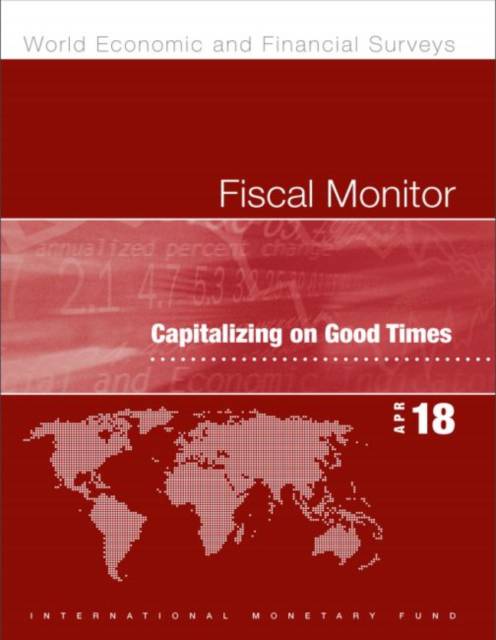
Door een staking bij bpost kan je online bestelling op dit moment iets langer onderweg zijn dan voorzien. Dringend iets nodig? Onze winkels ontvangen jou met open armen!
- Afhalen na 1 uur in een winkel met voorraad
- Gratis thuislevering in België vanaf € 30
- Ruim aanbod met 7 miljoen producten
Door een staking bij bpost kan je online bestelling op dit moment iets langer onderweg zijn dan voorzien. Dringend iets nodig? Onze winkels ontvangen jou met open armen!
- Afhalen na 1 uur in een winkel met voorraad
- Gratis thuislevering in België vanaf € 30
- Ruim aanbod met 7 miljoen producten
Zoeken
€ 62,95
+ 125 punten
Omschrijving
The April 2018 edition of Fiscal Monitor is focused on two broad themes: the burden of high global debt and the opportunities and challenges of digital government. Chapter 1 explores how strong and broad-based growth provides an opportunity to rebuild fiscal buffers now, improve government balances, and anchor public debt. One concern is the surge in global debt, which reached the record peak of US$164 trillion in 2016. Chapter 1 discusses how public debt plays an important role in the surge in global debt, which is at historic highs among advanced and emerging market economies. Rapidly rising debt among low income developing countries means that interest payments are taking up an increasingly large share of taxes and expenditure. Chapter 1 recommends putting deficits and debt firmly on a downward path toward their medium-term targets. The size and pace of adjustment need to be calibrated to each country's cyclical conditions and available fiscal space. Several low-income countries need to mobilize revenues, rationalize spending, and improve spending efficiency. Chapter 1 also urges countries to implement policies to support medium-term growth by promoting human and physical capital, and by increasing productivity. Chapter 2 discusses how digitalization presents opportunities and challenges for fiscal policy and the ways in which it can change how governments design and implement current and future policies. The chapter also discusses how digitalization can positively transform governments by improving tax policy and administration, increasing spending efficiency and enhancing fiscal management. Digitalization calls for a proactive, forward-looking, and comprehensive reform agenda. The chapter conveys that governments must address multiple political, social, and institutional weaknesses and manage digital risks. Digitalization is already an overwhelming trend that will accelerate further. Governments should embrace it, foresee it, and shape it.
Specificaties
Betrokkenen
- Auteur(s):
- Uitgeverij:
Inhoud
- Aantal bladzijden:
- 2
- Taal:
- Engels
- Reeks:
Eigenschappen
- Productcode (EAN):
- 9781484333952
- Verschijningsdatum:
- 30/04/2018
- Uitvoering:
- Paperback
- Formaat:
- Trade paperback (VS)
- Afmetingen:
- 217 mm x 280 mm
- Gewicht:
- 521 g

Alleen bij Standaard Boekhandel
+ 125 punten op je klantenkaart van Standaard Boekhandel
Beoordelingen
We publiceren alleen reviews die voldoen aan de voorwaarden voor reviews. Bekijk onze voorwaarden voor reviews.











